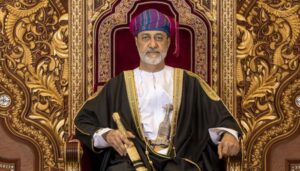Oman’s Economic Outlook Remains Favourable for 2024

Muscat, The Gulf Observer: Oman’s economic outlook for 2024 remains positive, with real growth anticipated to reach 1.5 percent, bolstered by increased gas production and ongoing diversification initiatives. This optimistic projection is highlighted in the Spring 2024 Gulf Economic Update (GEU).
Key efforts contributing to this growth include the enhancement of the business environment, support for small and medium enterprises (SMEs), and significant investments in renewable energy and green hydrogen. These measures are expected to provide a solid foundation for sustainable economic expansion.
Over the medium term, Oman’s growth is projected to accelerate further, driven by a recovery in global demand and increased investment in non-hydrocarbon sectors. The report also forecasts that inflation will stabilize around 2 percent during this period.
GCC Economic Prospects
The GEU report paints a promising picture for the Gulf Cooperation Council (GCC) region, with an anticipated economic rebound to 2.8 percent in 2024 and 4.7 percent in 2025. This recovery is not solely due to the expected relaxation of OPEC+ production quotas in the latter half of 2024 but also reflects the robust expansion of the non-oil economy. The GCC’s commitment to economic diversification underscores a strategic approach to fostering resilience and sustainable development amid global economic volatility.
Despite these diversification efforts, hydrocarbon revenues will continue to play a pivotal role in shaping the region’s fiscal and external balances in the medium term. Consequently, the GCC’s fiscal surplus is expected to narrow to 0.1 percent of GDP in 2024, with the current account surplus projected to be 7.5 percent of GDP, down from 8.4 percent in 2022.
Education and Human Capital Development
The GEU report emphasizes the critical role of education in sustaining long-term economic growth in GCC countries. Safaa El-Tayeb El-Kogali, the World Bank’s GCC Country Director, highlighted the need for improving education quality to enhance employment opportunities and wages, thus driving economic growth. Although GCC countries have made significant strides in learning outcomes over the past decade, they still lag behind international benchmarks.
Children in GCC countries are expected to complete 12.7 years of schooling by age 18. However, the actual learning is equivalent to only 8.6 years, indicating a loss of 4.1 years due to the quality of education. According to the World Bank’s Human Capital Index, a child born today in the GCC is expected to reach only 62 percent of their full productivity potential.
To fully leverage human capital, the report recommends that GCC countries invest in effective strategies to improve education quality, such as building foundational skills from early childhood, enhancing teaching practices, and using learning assessments to inform policy decisions.
Country-Specific Outlooks
- Bahrain: Economic growth is forecasted to rise to 3.5 percent in 2024, with the non-oil sector driving growth at nearly 4 percent, supported by tourism and infrastructure projects.
- Kuwait: Growth is expected to recover to 2.8 percent in 2024, driven by expansionary fiscal policies and increased oil production. The non-oil sector is projected to grow by 2.1 percent.
- Qatar: Real GDP growth is anticipated to strengthen marginally to 2.1 percent in 2024, with robust non-oil growth driven by tourism.
- Saudi Arabia: Following a contraction in 2023, real GDP is expected to grow by 2.5 percent in 2024, led by a 4.8 percent increase in non-oil private activities.
- United Arab Emirates (UAE): Real GDP growth is projected to accelerate to 3.9 percent in 2024, supported by a significant increase in oil production and strong performance in key non-oil sectors such as tourism and real estate.
The GEU report underscores the GCC’s strategic approach to economic diversification and human capital development as critical to sustaining long-term growth and resilience amid global economic challenges.


